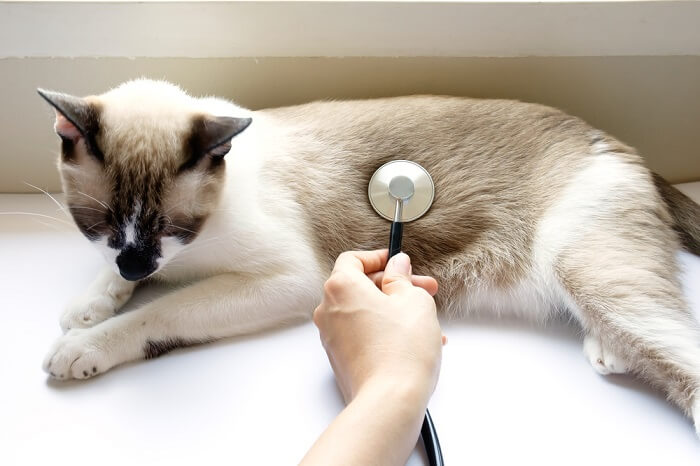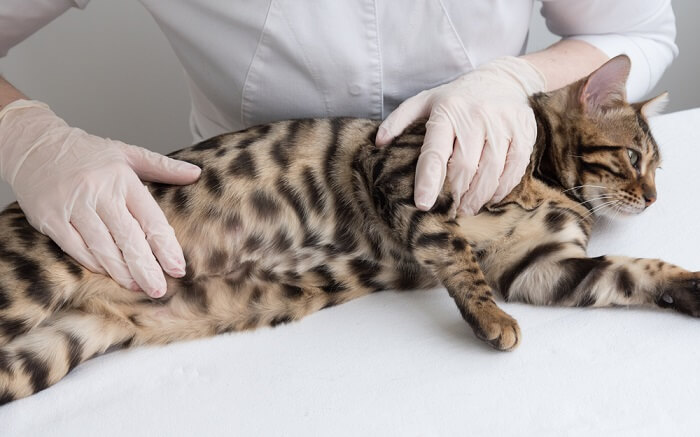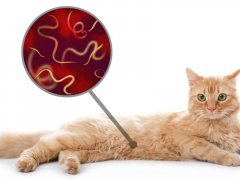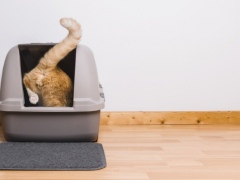
Intestinal cancer is a relatively uncommon form of cancer in cats, accounting for only a small percentage of all feline cancer cases. That’s good news because, when intestinal cancer does occur, it is a serious condition.
Approximately 90% of diagnosed feline intestinal tumors are malignant and metastasis is common. Intestinal cancer has often spread by the time of diagnosis, making it a challenge to treat.
What Is Intestinal Cancer in Cats?
Cancer refers to any malignant tumor that can metastasize or spread to other locations within the body. In intestinal cancer, the tumor is located anywhere within the intestines. This includes both the small intestine (duodenum, jejunum, and ileum) and the large intestine (cecum, colon, and rectum).
You may also hear the phrase “intestinal cancer” used in reference to cancer within the stomach, although this would more accurately be termed “gastrointestinal cancer”. Gastrointestinal refers to the entire digestive tract, while intestinal refers specifically to the intestines.
There are a variety of different cancers that can occur within the intestines, each of which requires different types of treatment. Additionally, the clinical signs of intestinal cancer can vary significantly, depending on the location of the tumor and tumor characteristics.
Causes of Intestinal Cancer

There are several types of intestinal cancer in cats, with lymphoma being the most common. The underlying cause is often difficult to identify.
Lymphoma is, by far, the most common intestinal cancer in cats. In many cases, the underlying cause of feline lymphoma cannot be determined. However, several known factors may predispose a cat to lymphoma.
Cats with Feline Leukemia Virus (FeLV) or Feline Immunodeficiency Virus (FIV) are more likely to develop lymphoma. Additionally, cats living in a home with smokers are significantly more likely to develop lymphoma. Finally, a link is suspected between chronic intestinal inflammation (such as that seen in food allergies) and lymphoma, although this link has not yet been proven.
Other common intestinal cancers in cats include adenocarcinoma, mast cell tumor, and leiomyosarcoma.
The underlying cause of these other types of intestinal cancer is unknown. Both genetic and environmental factors likely play a role in the development of intestinal cancer.
Intestinal cancer is typically seen in older cats, usually between ten and twelve years of age. Siamese cats appear to be genetically predisposed to intestinal cancer; a Siamese cat is almost twice as likely to develop intestinal cancer as a cat of another breed.
Symptoms of Intestinal Cancer
Intestinal cancer can cause a wide variety of gastrointestinal signs. These signs are often clinically indistinguishable from other gastrointestinal illnesses, which means that intestinal cancer can only be diagnosed through testing.
Common nonspecific signs of intestinal cancer (and other gastrointestinal diseases) include weight loss, lethargy, abdominal pain, and abdominal swelling.
Beyond those nonspecific signs, however, cats may develop additional signs based on the location of their intestinal cancer. Cats with small intestinal cancer show signs related to decreased small intestinal function.
Vomiting is often a predominant sign in these cats, and it may be accompanied by a decreased appetite or anorexia. In some cases, the vomit may contain undigested blood (lending a red/pink tinge to the vomit) or digested blood (which looks like coffee grounds).
Cats with large intestinal cancer may demonstrate a different set of clinical signs, related to the fact that their tumors are located lower in the intestines.
Affected cats may have diarrhea, caused by the inability of the colon to reabsorb water from the stool. Alternatively, affected cats may struggle to pass stool beyond their tumors and become constipated. If the tumor is bleeding, you may notice frank red blood in the stool.
All these signs can be caused by other gastrointestinal illnesses and are not specific to intestinal cancer. If your cat is showing any of these signs, a thorough workup will be needed to identify the cause of your cat’s intestinal issues.
Diagnosis of Intestinal Cancer in Cats

Diagnosis of intestinal cancer in cats begins with a physical examination, followed by laboratory testing.
If your cat is showing signs of gastrointestinal disease, your veterinarian will begin with a thorough physical examination. Your veterinarian will examine your cat’s overall health, looking at weight, coat quality, and overall body condition. Your cat’s abdomen (belly) will be palpated, to check for a palpable abdominal mass or thickening of the intestines.
Also Read: My Cat’s Belly Feels Firm: When To Worry?
Next, your veterinarian will probably recommend some basic laboratory tests.
A complete blood cell count and serum biochemistry profile will allow your veterinarian to rule out other causes of your cat’s gastrointestinal signs.
Many conditions can cause vomiting, diarrhea, and weight loss, so bloodwork is essential to narrow down the list of possible causes for your cat’s sign. Your veterinarian may find bloodwork abnormalities that suggest intestinal disease, such as anemia (caused by blood loss from bleeding tumors), low protein (caused by decreased protein absorption within the intestines), and elevated blood calcium levels (which can be seen with lymphoma).
If laboratory tests suggest intestinal disease, the next step is often imaging.
Radiographs (x-rays) may be used as an initial screening test, to look for large, obvious masses or signs of intestinal obstruction. Ultrasound is also typically recommended; it can help find smaller masses, intestinal thickening, and enlarged lymph nodes that may be present in your cat’s abdomen (belly).
If a mass is found, your veterinarian will biopsy the mass using endoscopy (a camera fed down the intestines) or surgery.
In some cases, ultrasound guidance may be used to obtain a fine needle aspirate of the mass before biopsy, to see if a diagnosis can be obtained without more invasive testing. In this test, a small needle is inserted into your cat’s abdomen and directly into the mass.
Regardless of whether a sample is obtained via biopsy or fine needle aspirate, the sample will be sent to a pathologist. The pathologist will prepare the sample and examine it closely under a microscope. The pathologist will be able to determine whether the mass is cancerous and, if so, what type of cancer is present.
Intestinal Cancer in Cats Treatment

The treatment of lymphoma, the most common intestinal cancer in cats, typically requires chemotherapy.
Surgical removal of the tumor may also be attempted, if possible, to help minimize signs of illness and improve the cat’s quality of life. Some cases of lymphoma, referred to as low-grade lymphoma, respond well to chemotherapy.
These cats may survive several years with treatment. If a cat has high-grade lymphoma, however, the prognosis is more guarded. A cat with high-grade lymphoma may only go into remission for a few months with chemotherapy, experiencing a rapid recurrence of signs.
If chemotherapy is not an option for your cat’s lymphoma, your veterinarian may recommend treatment with prednisone (a steroid) to alleviate some of your cat’s signs of gastrointestinal illness and provide palliative care (like hospice in humans).
On average, cats treated with prednisone for lymphoma have a survival time of two to three months.
With other types of intestinal cancer, treatment and prognosis depends upon the type of intestinal cancer that your cat has and whether it is localized (a single tumor) or diffuse (scattered throughout the intestines). Some isolated masses can be treated surgically, although chemotherapy may still be recommended to minimize the risk of spread. Cancers that are located diffusely throughout the intestines cannot be removed surgically. These masses are typically treated with chemotherapy.
Feline intestinal cancer is a challenging condition to diagnose because its signs can be confused with so many other illnesses. If your cat is showing gastrointestinal signs that do not resolve with simple treatment, talk to your veterinarian about performing diagnostic testing to get an accurate diagnosis. It’s worthwhile to do so because early diagnosis can lead to early treatment.







